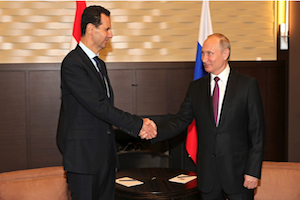The Meaning and End of Turkey-Russia Cooperation in Syria
By Micha’el Tanchum
February 20, 2020
The Turkey-Russia relationship is in the midst of a major reset. The outbreak of hostilities in Syria's Idlib province has left thirteen Turkish soldiers dead and seven Turkish military posts under siege by Russian-backed Syrian government forces. Prior policy convergences between Turkey and Russia had raised speculation about the prospect of a Turkish-Russian strategic partnership dominating the security architecture on Europe's southern borders. However, Ankara seems to have overplayed its hand in what is fundamentally a transactional relationship with Moscow. A total rupture in Turkish-Russian cooperation is unlikely, even in the event of a Turkish counter-offensive. However, Russia's reduced cooperation with Turkey will likely result in Russia's further development of more robust strategic partnerships with Turkey's rivals – the United Arab Emirates and Saudi Arabia.
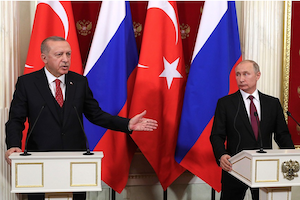
After Ten Days that Shook Syria: Turkey's Dependence on Russia Reaffirmed
By Cengiz Çandar
November 5, 2019
Turkey’s intrusion into northeastern Syria will have far-reaching consequences for Turkey, the balance of power in Syria and in the Middle East. The Rojava invasion also leaves a durable imprint on international relations at a global scale. It has left the United States in a weaker position, while Russia has strengthened its grip on Syria. Turkey’s dependence on Russia has been reaffirmed. The Russo-Turkish partnership in Syria may not prove long-lived since Moscow and Ankara have different, indeed fundamentally irreconcilable political priorities. It is unlikely that Turkey, dependent on the acquiescence of Russia and with an ailing economy, will be able to establish a permanent military presence on Syrian territory.
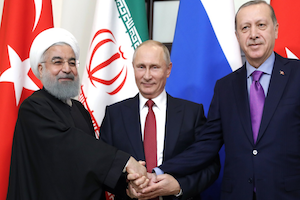
Syrian Safe Zone Moves U.S.-Turkey Relationship Beyond Kobani
By Micha’el Tanchum
August 29, 2019
With Turkey poised for a cross-border invasion to clear northeastern Syria of U.S.-aligned Kurdish forces, Washington and Ankara announced an agreement on August 7, 2019 to jointly create and patrol a safe zone in the region, averting the possibility of the two NATO allies exchanging fire. Far from a climb down for Ankara, the agreement enables Turkey to achieve its minimal goals, and probably more. At the same time, it provides a significant yet delicate reset opportunity for Turkey-U.S. relations that have been severely strained since the U.S.-Kurdish military partnership than began with Battle of Kobani.
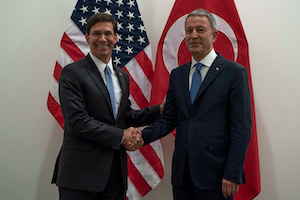
The Kurdish "Other" and the American Enemy Ensure the Cohesion of Turkey's Nationalist Regime
By Cengiz Çandar
February 14, 2019
The perception of a Kurdish threat from Syria, abetted by the United States, has provided the Turkish regime with its raison d’être. It is the glue that holds the power coalition of a variety of ultranationalists together. As long as the regime of President Recep Tayyip Erdoğan relies on the Kurdish “other” for its internal cohesion – and ultimately for its survival – that imperative will continue to determine Turkish foreign policy. But Turkey’s strategic reorientation is also sustained by a long history of deep-seated suspicion of American motives. Indeed, Turkish-American relations were never harmonious and their history has taught the Turkish state elite not to trust the United States, and never before had so much been at stake as today.
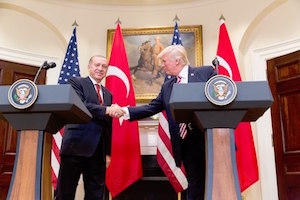
The Adana Protocol Re-Emerges as Russia and Arab Nations Align Against Turkey's Syrian Intervention
By Micha’el Tanchum
January 24, 2019
The December 19, 2018 announcement of the withdrawal of American forces from northeastern Syria was heralded as Washington's concession to Turkey's President Recep Tayyip Erdoğan, giving him a green light for the eradication of the PKK-affiliated Kurdish forces of the People's Protection Units (YPG). However, Turkey's planned intervention to create a 'safe zone' in northern Syria east of the Euphrates river has been complicated by the recent reconciliation of key Arab nations with the regime of Bashar al-Assad to oppose Turkish ambitions. The Arab alignment with Russia's opposition to Turkey's intervention weakened Erdoğan's bargaining position in his January 23, 2019 meeting in Moscow with Russian President Vladimir Putin and may force Turkey to accept alternative arrangements for the safe zone based on the 1998 Adana Protocol between Ankara and Damascus.
